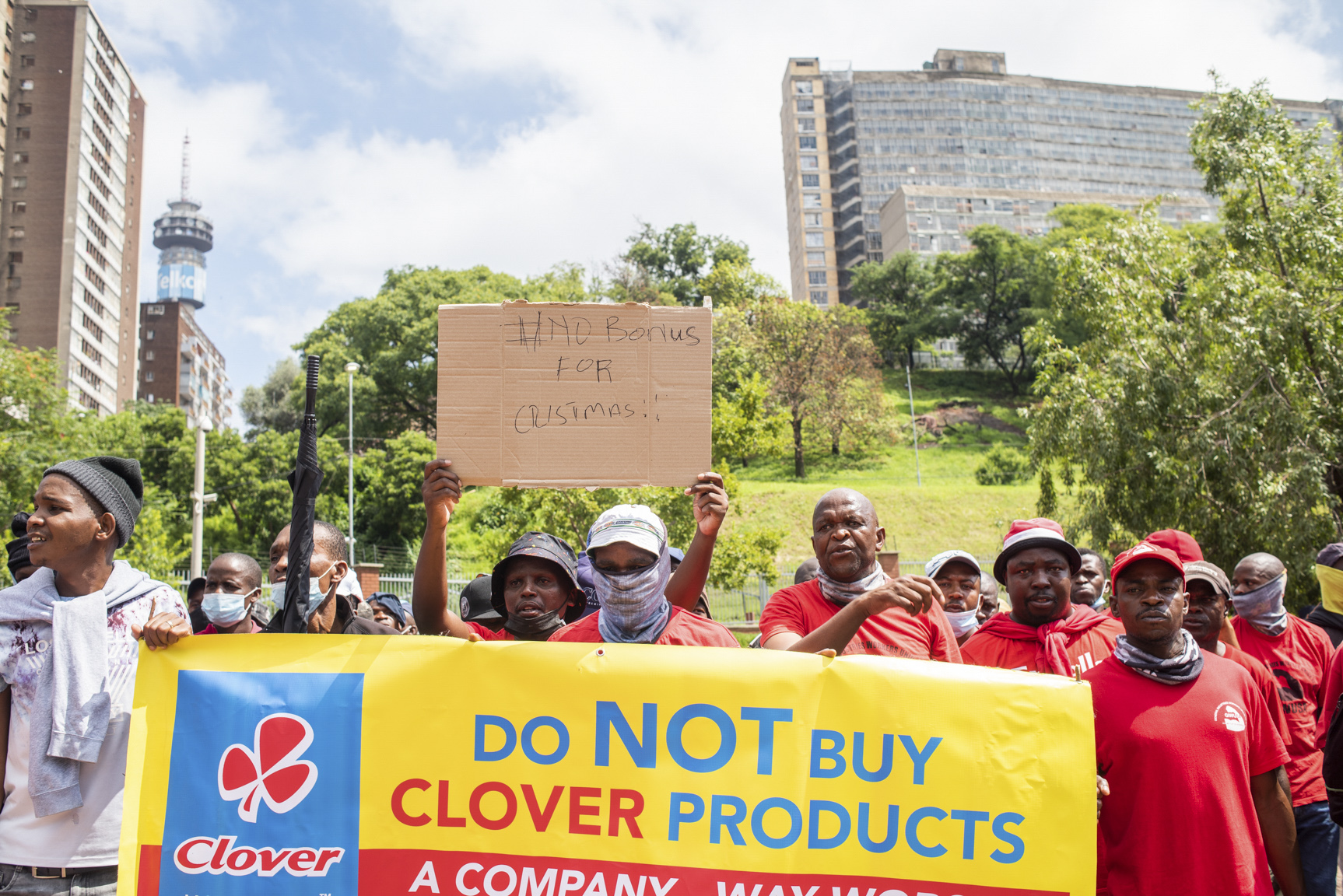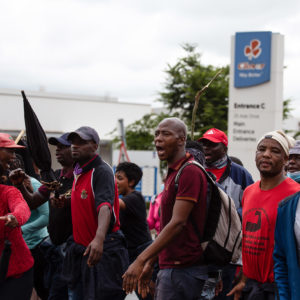The Clover strike heads to court
Labour unions say the dairy company’s attempt to end the strike and halt the boycott of its products through legal means and violent intimidation is a threat to democracy as a whole.
Author:
21 January 2022

The boycott of Clover products is spreading nationwide as the dairy company approaches the labour court for an interdict against both the worker strike and the consumer boycott campaign.
Workers have been going into stores to disrupt product sales and some supermarkets around Cape Town have not stocked Clover products for as long as eight weeks, since shortly after the strike began. According to the General Industries Workers Union of South Africa (Giwusa), supermarkets in cities such as Polokwane are now following suit.
*Jabulani Mzelemu was part of the group of workers who packed up Clover products in four supermarkets around Gqeberha in the Eastern Cape on Tuesday 18 January. They were mostly educating customers on why they shouldn’t buy Clover products, said Mzelemu.
“We went to Shoprite, Spar and Boxer stores. We explained that workers were being mistreated at Clover, so people should stop buying Clover to support the workers’ fight for their rights. Most people listened and said they have heard what is happening there, they know what to do.”
Related article:
Clover wants the strike to be considered unprotected and workers stopped from hindering product sales. Giwusa has submitted an affidavit opposing the company’s interdict application. The labour court will hear both applications on Friday 21 January.
Giwusa said the interdict is a compromise of democracy as mass mobilisation is the core tool of fighting for workers. “Boycotts act as a key component to support industrial actions by workers, raise awareness and build broader solidarity for these strike actions. During apartheid, boycotts in general and consumer boycotts were pivotal in industrial disputes and the battle towards the demise of apartheid.
“Today, we use them as some of the methods to express solidarity with the Palestinian people facing brutal occupation by the Israeli state. The South African Constitution, which enshrines the right to freedom of expression and the right to strike, cannot allow bans on boycott activities. Any ban on boycott activities would be unconstitutional.”
Business allies
More than 60 organisations support the cause of the workers, but also the cause of Palestinians who are living under systemic oppression from the Israeli state. The Central Bottling Company in Israel, which bought the majority share of Clover through its South African subsidiary Milco, is said to be situated on land stolen from Palestinians and associated with crimes against Palestinians. A manager from Grassy Park Spar in Cape Town says that is the motivation for the branch to boycott Clover products.
“My boss and some of our staff are Muslim and so we don’t want to be supplied by Clover because that will mean we are sending money to Israel and supporting what is happening to Palestinians there. This is our way of keeping our brothers in our prayers,” said the man, who declined to be named.
Some stores have not stocked Clover products for business reasons and decided they will only resume selling them once the strike is over.
Related article:
A Clover delegation went to Ladismith Cheese in the Western Cape on 13 January to negotiate a deal for the company to produce cheese and powdered milk for Clover. But workers heard about it and said they would not produce any products for Clover.
Karel Swartz from the Commercial, Stevedoring, Agricultural and Allied Workers Union said that if the bosses at Ladismith Cheese insist on producing for Clover, the workers will go on a secondary strike.
“We have made ourselves clear. Under no circumstance will our workers be forced to make Clover products. We are resolute in our stance to support fellow workers at Clover,” said Swartz.
Unnecessary violence
Giwusa said the peaceful nature in which the boycotts have been carried out makes Clovers’ violence towards workers unwarranted.
Security personnel shot rubber bullets at workers inside Clover’s Clayville premises in Ekurhuleni on Tuesday 18 January. The workers were in a meeting to discuss labour broker workers who have not had work for a year despite the Commission for Conciliation, Mediation and Arbitration instructing Clover to employ them full-time. Union officials said they were handing out bread to the workers when they were suddenly under fire, and about 300 workers scattered and ducked to avoid the rubber bullets.
“The tendency from the bosses is to paint the boycott actions as inherently criminal and amounting to looting. This is not true. The groups of activists that have been loading Clover products into trolleys at supermarkets have not been damaging these goods. Others who have pasted #BoycottClover signs next to Clover products in retail stores have also not damaged these products,” said Giwusa.
Related article:
“This should be contrasted with the violent, strike-breaking methods our members have faced, including being shot at with rubber bullets by Clover’s private security, multiple cars being petrol-bombed and intimidating phone calls to shop stewards to end the strike.”
Giwusa president Mametlwe Sebei says the attacks are an attempt by Clover to criminalise the strike by causing chaos so the courts can deem it illegal.
“It is clear that Clover is not entirely confident of its case and wants to impose the rotten deal on the workers’ strike by bloody methods where trickery, lying and blackmail failed. And if that doesn’t succeed, to create an environment that will compel the court to order an end to the strike in the name of public order, for which there is no threat except Clover’s actions,” he says.
*Not his real name.
Naledi Sikhakhane is the 2022 Eugene Saldanha Fellow in social justice journalism.
Correction, 24 May 2022: The Eugene Saldanha Memorial fellowship is supported by the SET. It was incorrectly referred to as a fund.



